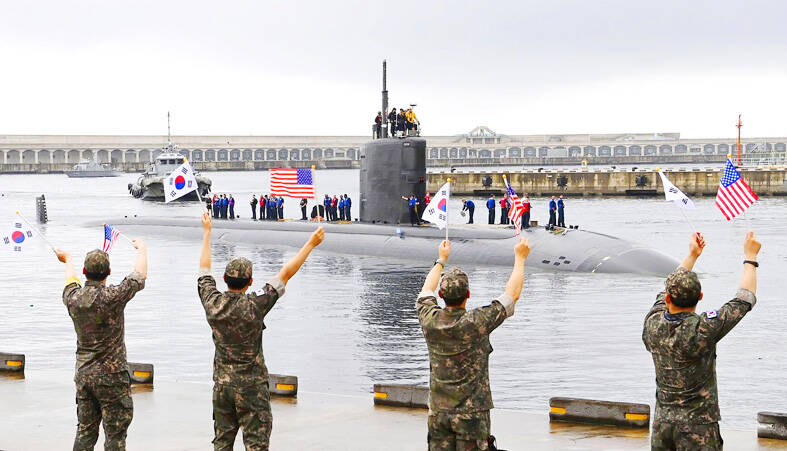A nuclear-propelled US submarine has arrived in South Korea in the second deployment of a major US naval asset to the Korean Peninsula this month, South Korea’s military said yesterday, adding to the allies’ show of force to counter North Korean nuclear threats.
The USS Annapolis arrived at a port on Jeju Island about a week after the USS Kentucky docked at the mainland port of Busan.
The Kentucky was the first US nuclear-armed submarine to visit South Korea since the 1980s. North Korea reacted to its arrival by test-firing ballistic and cruise missiles in apparent demonstrations that it could make nuclear strikes against South Korea and deployed US naval vessels.

Photo: AP / South Korean Ministry of National Defense
In between those launches, North Korea’s defense minister issued a veiled threat insisting the Kentucky’s docking in South Korea could be grounds for Pyongyang to use a nuclear weapon against it. North Korea has used similar rhetoric before, but the statement underscored how much relations are strained.
The Annapolis, whose main mission is destroying enemy ships and submarines, is powered by a nuclear reactor, but is armed with conventional weapons.
The Annapolis docked at Jeju mainly to load supplies, but Jang Do-young, a spokesperson for the South Korean navy, said the US and South Korean militaries were discussing whether to arrange training involving the vessel.
Meanwhile, the US-led UN Command yesterday said it had started a conversation with North Korea about US Private Travis King who last week ran into the North across one of the world’s most heavily fortified borders.
Andrew Harrison, a British lieutenant general who is the deputy commander at the UN Command, refused to say when the conversation started, how many exchanges have taken place and whether the North Koreans responded constructively, citing the sensitivity of the discussions.
He also declined to detail what the command knows about King’s condition.

MAKING WAVES: China’s maritime militia could become a nontraditional threat in war, clogging up shipping lanes to prevent US or Japanese intervention, a report said About 1,900 Chinese ships flying flags of convenience and fishing vessels that participated in China’s military exercises around Taiwan last month and in January have been listed for monitoring, Coast Guard Administration (CGA) Deputy Director-General Hsieh Ching-chin (謝慶欽) said yesterday. Following amendments to the Commercial Port Act (商港法) and the Law of Ships (船舶法) last month, the CGA can designate possible berthing areas or deny ports of call for vessels suspected of loitering around areas where undersea cables can be accessed, Oceans Affairs Council Minister Kuan Bi-ling (管碧玲) said. The list of suspected ships, originally 300, had risen to about 1,900 as

Right-wing political scientist Laura Fernandez on Sunday won Costa Rica’s presidential election by a landslide, after promising to crack down on rising violence linked to the cocaine trade. Fernandez’s nearest rival, economist Alvaro Ramos, conceded defeat as results showed the ruling party far exceeding the threshold of 40 percent needed to avoid a runoff. With 94 percent of polling stations counted, the political heir of outgoing Costa Rican President Rodrigo Chaves had captured 48.3 percent of the vote compared with Ramos’ 33.4 percent, the Supreme Electoral Tribunal said. As soon as the first results were announced, members of Fernandez’s Sovereign People’s Party

Japan’s strategic alliance with the US would collapse if Tokyo were to turn away from a conflict in Taiwan, Japanese Prime Minister Sanae Takaichi said yesterday, but distanced herself from previous comments that suggested a possible military response in such an event. Takaichi expressed her latest views on a nationally broadcast TV program late on Monday, where an opposition party leader criticized her for igniting tensions with China with the earlier remarks. Ties between Japan and China have sunk to the worst level in years after Takaichi said in November that a hypothetical Chinese attack on Taiwan could bring about a Japanese

MORE RESPONSIBILITY: Draftees would be expected to fight alongside professional soldiers, likely requiring the transformation of some training brigades into combat units The armed forces are to start incorporating new conscripts into combined arms brigades this year to enhance combat readiness, the Executive Yuan’s latest policy report said. The new policy would affect Taiwanese men entering the military for their compulsory service, which was extended to one year under reforms by then-president Tsai Ing-wen (蔡英文) in 2022. The conscripts would be trained to operate machine guns, uncrewed aerial vehicles, anti-tank guided missile launchers and Stinger air defense systems, the report said, adding that the basic training would be lengthened to eight weeks. After basic training, conscripts would be sorted into infantry battalions that would take